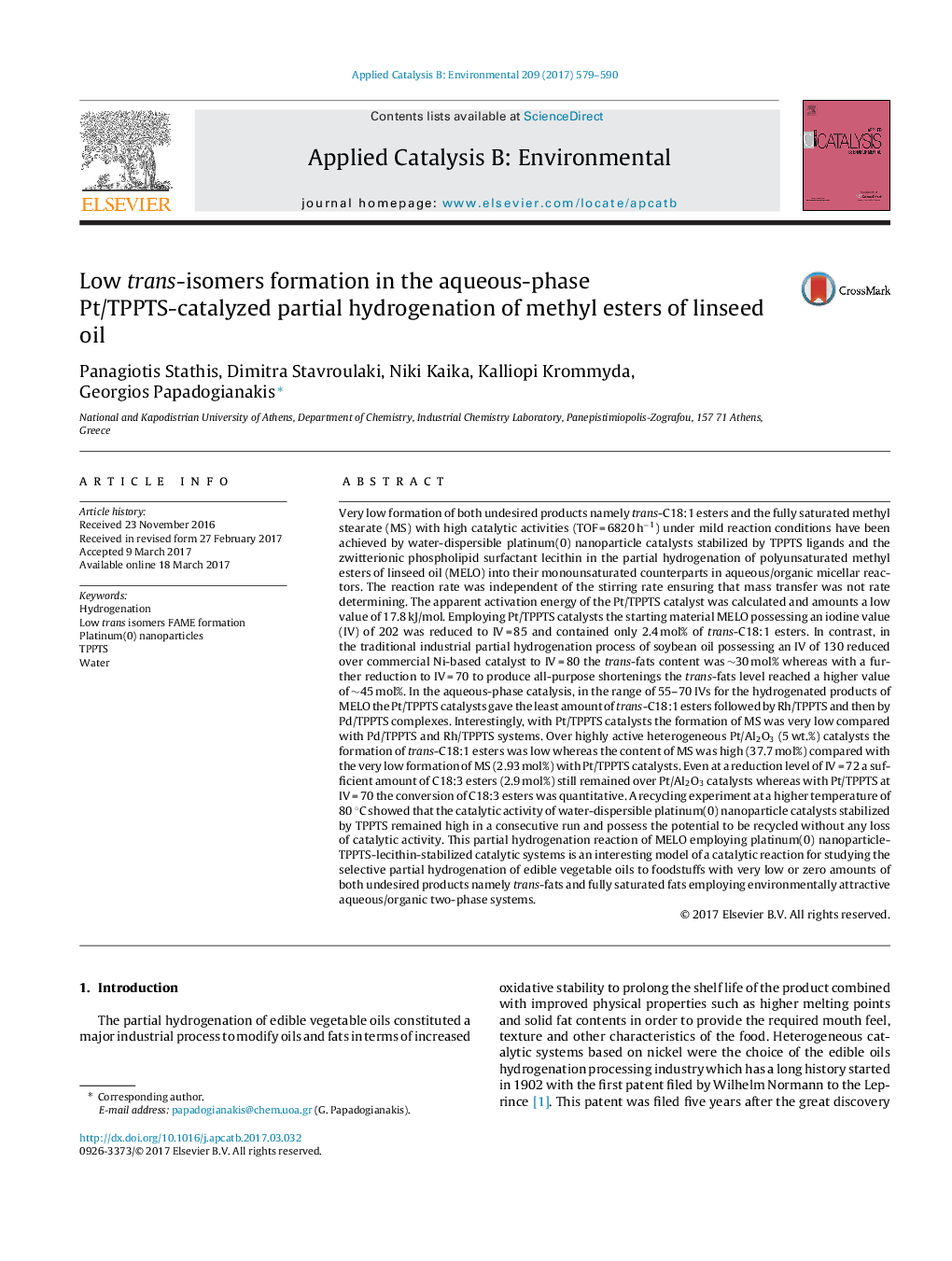| کد مقاله | کد نشریه | سال انتشار | مقاله انگلیسی | نسخه تمام متن |
|---|---|---|---|---|
| 6454236 | 1418811 | 2017 | 12 صفحه PDF | دانلود رایگان |

- Very low formation of undesired trans-C18:1 esters (0.1Â mol%) using novel water-soluble Pt/TPPTS catalytic complexes.
- Hydrogenation of renewable polyunsaturated methyl esters of linseed oil.
- Model reaction for studying the selective hydrogenation of edible vegetable oils with very low or zero trans-fats.
- High activities of Pt/TPPTS catalysts (TOFÂ =Â 6820Â hâ1).
- Environmentally friendly aqueous medium.
Very low formation of both undesired products namely trans-C18:1 esters and the fully saturated methyl stearate (MS) with high catalytic activities (TOF = 6820 hâ1) under mild reaction conditions have been achieved by water-dispersible platinum(0) nanoparticle catalysts stabilized by TPPTS ligands and the zwitterionic phospholipid surfactant lecithin in the partial hydrogenation of polyunsaturated methyl esters of linseed oil (MELO) into their monounsaturated counterparts in aqueous/organic micellar reactors. The reaction rate was independent of the stirring rate ensuring that mass transfer was not rate determining. The apparent activation energy of the Pt/TPPTS catalyst was calculated and amounts a low value of 17.8 kJ/mol. Employing Pt/TPPTS catalysts the starting material MELO possessing an iodine value (IV) of 202 was reduced to IV = 85 and contained only 2.4 mol% of trans-C18:1 esters. In contrast, in the traditional industrial partial hydrogenation process of soybean oil possessing an IV of 130 reduced over commercial Ni-based catalyst to IV = 80 the trans-fats content was â¼30 mol% whereas with a further reduction to IV = 70 to produce all-purpose shortenings the trans-fats level reached a higher value of â¼45 mol%. In the aqueous-phase catalysis, in the range of 55-70 IVs for the hydrogenated products of MELO the Pt/TPPTS catalysts gave the least amount of trans-C18:1 esters followed by Rh/TPPTS and then by Pd/TPPTS complexes. Interestingly, with Pt/TPPTS catalysts the formation of MS was very low compared with Pd/TPPTS and Rh/TPPTS systems. Over highly active heterogeneous Pt/Al2O3 (5 wt.%) catalysts the formation of trans-C18:1 esters was low whereas the content of MS was high (37.7 mol%) compared with the very low formation of MS (2.93 mol%) with Pt/TPPTS catalysts. Even at a reduction level of IV = 72 a sufficient amount of C18:3 esters (2.9 mol%) still remained over Pt/Al2O3 catalysts whereas with Pt/TPPTS at IV = 70 the conversion of C18:3 esters was quantitative. A recycling experiment at a higher temperature of 80 °C showed that the catalytic activity of water-dispersible platinum(0) nanoparticle catalysts stabilized by TPPTS remained high in a consecutive run and possess the potential to be recycled without any loss of catalytic activity. This partial hydrogenation reaction of MELO employing platinum(0) nanoparticle-TPPTS-lecithin-stabilized catalytic systems is an interesting model of a catalytic reaction for studying the selective partial hydrogenation of edible vegetable oils to foodstuffs with very low or zero amounts of both undesired products namely trans-fats and fully saturated fats employing environmentally attractive aqueous/organic two-phase systems.
104
Journal: Applied Catalysis B: Environmental - Volume 209, 15 July 2017, Pages 579-590